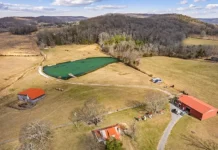WARREN COUNTY – Vacation developments around the region and the state suffered greatly during the housing bust a few years ago along with the rest of the industry. A lot of vacation homes went to foreclosure as owners sought to rid themselves of added expenses in tough times.
Developers watched as sales dried up and developments struggled. Many cut lot prices hoping to generate sales, putting more pressure on the market as supply increased. Overton Retreat, a second-home development on Long Mountain in Warren County, didn’t have such troubles. While others struggled, they chose to invest more: A second private lake, tennis courts and a fitness center.
The developer, a group consisting of several Nashville businessmen, held to their plan of creating a vacation place that families can pass through generations similar to long established spots like the Adirondacks. With that, the developer didn’t relax design standards that ensure quality homes are built, nor cut prices to drive sales.
Over the past 12 years, Overton Retreat has become a weekend getaway for mostly Nashville and Williamson County people on 1,300 acres. There are 25 homes completed or under construction and 62 lots of nearly 90 available have been sold. And there’s room for more lots as demand dictates.
The development’s name may be a bit confusing because of Overton County. There is a connection. Jesse Overton established the family getaway from Nashville in the early 1920s in Warren County. His grandfather was John Overton, an Andrew Jackson confidant, judge and land developer in Tennessee for whom Overton County is named. Jesse Overton’s family lodge served as a family retreat for decades and the house still stands today near the development’s entrance.
The Nashville-based group began developing Overton Retreat 12 years ago by pulling together several area properties on the mountain. A portion of the assembled property was donated to Montgomery Bell Academy, a private school in Nashville, for an observatory. They purposely aren’t in a hurry with the development. Unlike other developments, Overton Retreat hasn’t had to sell lots to cover a bank note.
“We weren’t leveraged,” David Bohman, a principal in the development, said of why Overton Retreat was able to weather the Great Recession unscathed. “Leverage is great if values and prices are going up. But it can get you into trouble if values drop. We are very conservatively managed.”
Bohman added that they held prices to protect the values for existing owners. Overton Retreat’s lots start at $75,000 and range 1.5-4 acres in size. A limited number of the lots have views of the private lakes. All others are located on the bluff and have a view of the Rocky River Valley or the unlimited vista to the west over McMinnville and beyond. When they got under way with the development, the developer chose a soft sell approach to finding buyers for the lots. The biggest “advertising” presence consists of a 10-year sponsorship of Nashville Public Radio programming.
“We are taking the long view of this,” said Jimmy Webb, a lead principal in Overton Retreat and a co-founder of Freeman-Webb, one of the largest private owners of apartments in the Southeast. “When we started this, we wanted to create a development that capitalized on the natural beauty of the property and where homes are passed down through generations of family.”
That long view has meant establishing design standards that encourage rustic historic architecture reinterpreted in modern forms using natural materials.
“We’re all about quality, not about ostentatious homes,” Webb said. “The idea is to emulate the great Adirondacks camps in New York.”
The cabins in those camps weren’t necessarily large structures. As such, there is no minimum size requirement. While there are some larger homes built, there are also homes in the development measuring 1,200-1,500 square feet. Homes could have even smaller livable space as long as they meet design standards, Bohman said.
Nantucket, Mass.-architect Chip Webster created Overton Retreat’s design standards and master plan with the idea of encouraging creativity in architectural forms and styles.
“The goal was to create a natural community,” Webster said. “We wanted a lot of open space, and we sought to have homes blend in with the native forest and natural features of the landscape.”
With a nod toward the Adirondack Great Camps, Overton Retreat spread amenities throughout the development, a distinguishing characteristic from other getaway developments around the Southeast where amenities are clustered together. Bohman noted those developments tend to provide only a clubhouse or a swimming pool.
With Overton Retreat, the activities center is at the edge of one lake and a large timber-framed pavilion is at the edge of another lake. There are hiking trails throughout the development. In keeping with the development’s design theme, the activities center looks like an old barn. For a signature structure, Overton Retreat’s architects designed the lakeside pavilion with twists and curves down its length to provide an organic feel, according to Bohman.
The pavilion’s construction is an engineering feat. It is made of old growth Douglas fir shipped from coastal Oregon. The wood beams and trusses were assembled with oak pegs and topped with a custom copper roof. A double-sided stone chimney serves as one bracing element for the structure.
Both lakes are stocked with largemouth bass and Overton Retreat owners canoe, fish, or swim from the barn or the pavilion area. There are no gas-powered motors on the lake.
By adding the second lake and other amenities in a down market, the developer not only sought to protect value for existing owners but also create more features to help attract future owners.
“We chose not to cut prices to compete,” Bohman said. “Instead, we chose to invest in improving the Overton Retreat’s quality as a way to come out of the recession with more to offer.”








